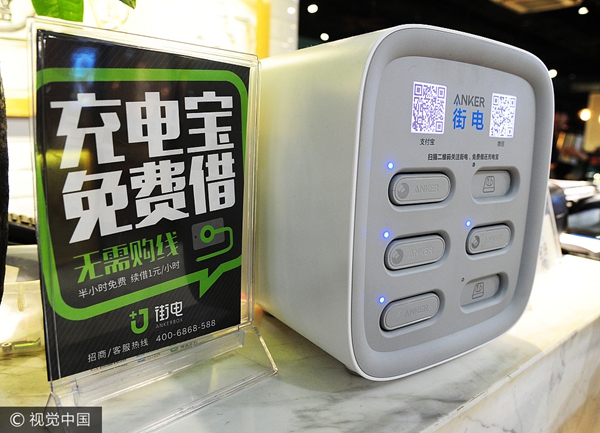Does power bank sharing save your batteries?
- By Niu Jingjing
 0 Comment(s)
0 Comment(s) Print
Print E-mail China.org.cn, June 12, 2017
E-mail China.org.cn, June 12, 2017
|
One type of Anker with six sharable power banks. [Photo/VCG] |
It is common for most Chinese to carry their smart phones with them when they go out. But the more powerful they become, the less their batteries can keep up. Charging has become a problem outside home. Can power bank sharing help people out?
Recently, many charging machines have been spotted at restaurants, coffee shops, KTVs and shopping malls across China. These are called "sharable chargers" or "shared power banks."
Users only need to follow the official WeChat account, scan a QR code and jump-start with a deposit to rent a convenient power source.
Anker, a brand of sharable chargers, offers six to twelve portable power banks at some restaurants, bars and KTVs. Once mobile phones have to be charged, users only need to make a deposit of 100 yuan or waive it if their Alipay-based Sesame Credit score – a credit evaluation system built on people's e-commerce behaviors – is over 600. It is free for the first hour and after will be charged on an hourly basis to at most 10 yuan per day. Users must return their power banks to the same branded machines to get their deposit back.
According to the latest report by the Ministry of Industry and Information Technology of China, there were 1.35 billion mobile phone users in China by the end of April this year. Most business transactions are conducted through online payment platforms such as WeChat and Alipay. Travel routes or information is mostly checked through online maps. Families and friends are linked by online social networks. In short, Chinese need their mobile phones to function, twenty-four hours a day, especially during the period when they aren't at home.
Coupled with the sharing economy craze prevalent across the country, billions of RMBs have been poured into the market thanks to big names such as Tencent, Alibaba and Jumei. At the moment, the three biggest players in the market are Xiaodian, Anker and Laidian.
"I haven't seen a sharable power bank before. I think next time when my phone is ready to power off without a power bank in my bag, I will use it," said an Italian university student named Giulia who found a Xiaodian charging device when studying at a coffee shop in Beijing.
Mrs. Cai, manager of the coffee shop, said they had three charging devices, and that during the first week two or three customers used the device per day.
Recently, Chen Ou, CEO of an online retailer of beauty products, invested 300 million in shared power bank company Anker. Chinese billionaire Wang Jianlin's son, Wang Sicong, subsequently commented, "If power bank sharing can take off, I will eat some turd."
Some say even though the shared power bank business can generate fast returns with a low attrition rate and cost from an investor's perspective, there exists some problems: using shared power banks isn't a rigid demand for all phone users; mobile power banks have been getting lighter and smaller and phone batteries are getting better; there are still technical defects such as potential security problems and privacy issues.
So far, whether the business of power bank sharing can save batteries is at its infancy, but there is no denying that the sharing economy is spreading to make life easier for Chinese.
"I think the sharable power bank is easy to use, much like other sharable products," a woman said after she first borrowed one to charger at a shopping mall in the capital.







Go to Forum >>0 Comment(s)